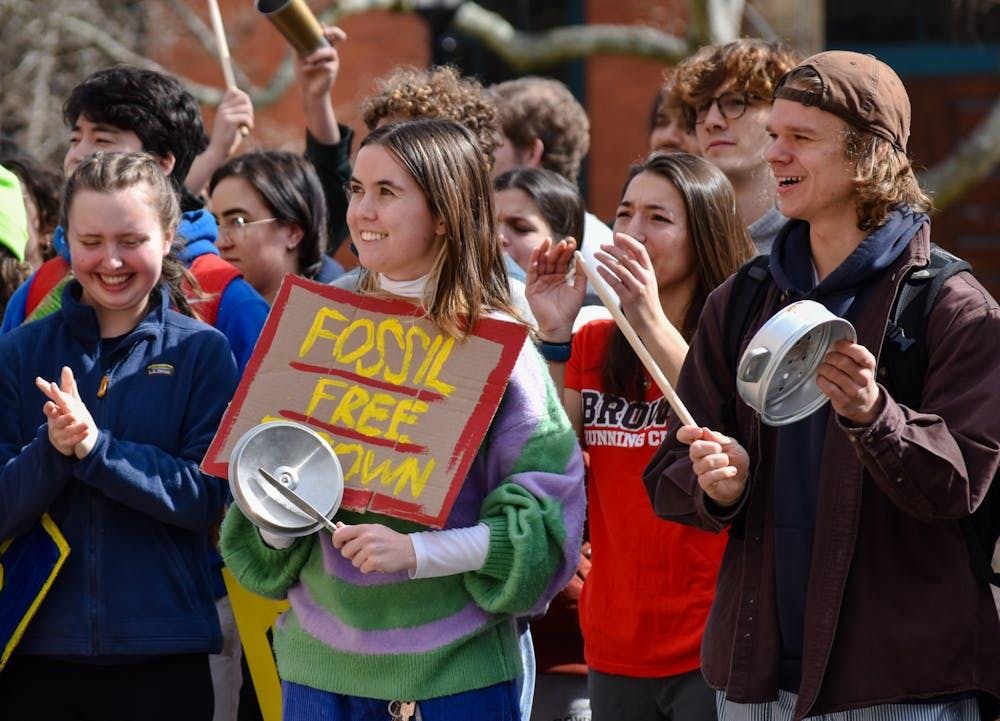As the divestment push has stretched into the fall and a vote by the Corporation — Brown’s highest governing body — on whether to divest nears, climate activists have continued their original campaigns while intertwining their efforts with the movement on campus to divest from companies with ties to Israel's military.
Last spring, Sunrise Brown’s week-long “Reclaim Earth Day” programming was canceled in support of the encampment on the Main Green demanding divestment from Israel. That same day, Sunrise organizers published a statement on their Instagram, explaining that “there is no environmental justice without justice more broadly.”
“We felt that (the encampment) was the most important thing to be taking up space on campus,” said Garrett Brand ’26, one of Sunrise Brown’s co-coordinators. “We did not want there to be any sense of competing for attention or visibility.”
In addition to its humanitarian impact, the “horrific environmental consequences” of the war in Gaza have mobilized Sunrise members around the divestment campaign, Brand told The Herald.
In early September, more than 100 “climate-oriented” community members — including several Sunrise Brown members — submitted a letter to Brown’s Advisory Committee on University Resources Management, or ACURM, laying out the environmental arguments for divestment from companies with ties to Israel.
Sunrise Brown also submitted a statement to ACURM encouraging its members to make “an unequivocal recommendation in favor of divestment.”
According to Chloe Daniel ’27, a leader of Sunrise’s community task force, Sunrise Brown members are largely supportive of the divestment campaign because of commonalities they see between the two movements.
“What’s even the point of protecting the environment if you’re not going to care for the people in it?” Daniel said.
Caitlyn Carpenter ’26, another Sunrise Brown co-coordinator, said that there is overlap between the Israel divestment push and Sunrise Brown’s ongoing campaign urging Brown to fully disassociate from the fossil fuel industry.
Over the last two years, Sunrise Brown has pushed the University to cut all financial ties with the fossil fuel industry. The group presented their proposal to ACURM last spring, and they shared their experiences from that process with pro-divestment activists.
While the University has not formally divested from fossil fuels via a decision by the Corporation, it sold 90% of its fossil fuel investments by 2020 and planned to sell the remainder “as it becomes possible to do so,” The Herald previously reported.
According to Carpenter and Brand, President Christina Paxson P’19 P’MD’20 received ACURM’s recommendation on fossil fuel dissociation during the summer. Sunrise Brown plans to spend this semester pressuring the University to release the recommendation publicly.
Sunrise Brown has also continued to push back against fossil fuel ties on campus. Earlier this month, the group’s members disrupted a Brown Investment Group event’s keynote speaker to protest the impacts of fossil fuels and related investments.
Last spring, Sunrise launched the second part of their DIRE campaign — a combination of the words “dissociate” and “reinvest” — which calls on the University to dissociate from the fossil fuel industry and prioritize issues of environmental justice in its relationships with the Providence community.
In their new “Respect Report,” Sunrise Brown outlines the University’s environmental impacts on the city and provides a series of recommendations for future community engagement.
This semester, Sunrise Brown will focus on the “dissociation” aspect of the DIRE campaign, and will also be “laying the groundwork and establishing relationships” to develop the “respect” campaign now that the report has been released, Brand said.

Sophia Wotman is a University news editor covering activism and affinity & identity. She is a junior from Long Island, New York concentrating in Political Science with a focus on women’s rights. She is a jazz trumpet player, and often performs on campus and around Providence.





